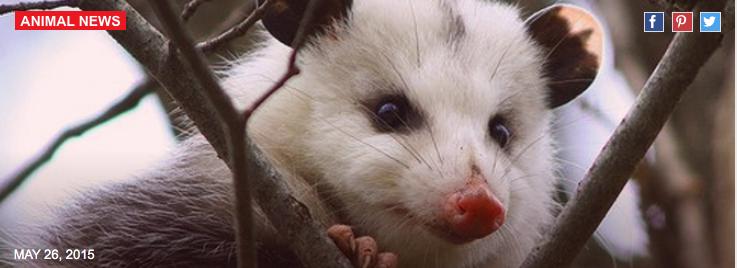I’ve always been dismayed at how much humans living in the US deplore opossums (Didelphis virginianus). I don’t understand this. They are, evolutionarily speaking, true survivors – the only marsupial species that remains in the US from the magnificent marsupial radiation that occurred in the North American continent some 60 – 70 million years ago. Indeed, even though there is a lot of uncertainty surrounding the timing of marsupial evolution, the first undoubted marsupial taxon (Peradectes minor) hails from Montana circa 65 million years ago. From North America, marsupials made their way down through Central and South America; in the New World – this is where most remain today. All marsupial species in North America went extinct – they simply could not compete against modern placental mammals that were radiating throughout the world – except for the Virgina opossum, friendly (and useful!) visitor to your backyard.
Today, opossums are found throughout the United States, in a wide diversity of habitat types and in a range of human-modified landscapes, including suburban and urban – where they are almost universally disparaged. Yet, as noted by Dawn Papple, in her post “Opossums: The Unsung Heroes Against Lyme Disease and Other Tick-Borne Diseases“:
“When left alone, the opossum does not attack pets or other wildlife; he does not chew your telephone or electric wires, spread disease, dig up your flower bulbs or turn over your trash cans. On the contrary, the opossum does a great service in insect, venomous snake, and rodent control. He takes as his pay only what he eats, and maybe a dry place to sleep. The ‘possum tolerates our pets, our cars, prodding sticks, rocks and brooms. ‘Attacks’ by opossums are simply non-existent. When he gets too close, or accidentally moves into your attic space, he can be easily convinced to move along. If you are lucky enough to have one of these guys come around, you can rest assured he is cleaning up what he can, and will soon move along to help someone else.”
Moreover, as documented by Keesey et al (2009) in their article Hosts as ecological traps for the vector of Lyme Disease (published in the Proceedings of the Royal Society B), opossums are a critical means by which tick populations – hence Lyme disease – can be reduced.
Next time you see an opossum in your backyard – don’t disparage it, shoot it, trap it… Instead view it for what it is: a wonder of evolutionary history, a survivor, one of the most adaptable species you’ll have the privilege of interacting with.
And, be grateful that it is helping to limit the spread of Lyme Disease.
Image from: http://www.inquisitr.com/2106782/opossums-the-unsung-heroes-against-lyme-disease-and-other-tick-borne-diseases/
References:
1. Papple, D (2015) Opossums: the unsung heroes against Lyme Disease and other tick-borne diseases. Inquisitr – News Worth Reporting, May 26.
2. Branning, M (2016) Sharing our cities – making peace with the ‘possum. DFW Wildlife Coalition.
3. Keesing F, Bunner J, duerr S, Kililea M, LoGiudice K, Schmidt K, Vuong H, and Ostfeld (2009) Hosts as ecological traps for the vector of Lyme disease. Proceedings of the Royal Society B, 276(1675): 3911-3919

